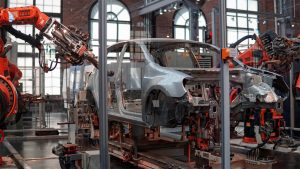The world of international trade is constantly evolving, and it’s important to keep up with the latest trends and developments. From emerging markets to geopolitical conflicts, there are many factors that can impact global trade, and we’ll be discussing some of them today. So, grab a cup of coffee, sit back, and let’s dive into this exciting and ever-changing topic.
Go ahead and watch today’s video before you read the rest of the newsletter…I promise you’ll understand why that first paragraph was so painfully awkward!
If you watched the video, you can probably see why I’m not worried about my job security. While AI is going to change the way we do a lot of things, it still needs some time before it’s cracking the kind of nuanced jokes I’m famous for.
However, there are quite a few spaces where AI is already disrupting the job market, and if you don’t want to be fighting the machines…it may be time to adapt or pick up a new trade.
Prefer to read the transcript of the video? Click here
Here at Zeihan On Geopolitics we select a single charity to sponsor. We have two criteria:
First, we look across the world and use our skill sets to identify where the needs are most acute. Second, we look for an institution with preexisting networks for both materials gathering and aid distribution. That way we know every cent of our donation is not simply going directly to where help is needed most, but our donations serve as a force multiplier for a system already in existence. Then we give what we can.
Today, our chosen charity is a group called Medshare, which provides emergency medical services to communities in need, with a very heavy emphasis on locations facing acute crises. Medshare operates right in the thick of it. Until future notice, every cent we earn from every book we sell in every format through every retailer is going to Medshare’s Ukraine fund.
And then there’s you.
Our newsletters and videologues are not only free, they will always be free. We also will never share your contact information with anyone. All we ask is that if you find one of our releases in any way useful, that you make a donation to Medshare. Over one third of Ukraine’s pre-war population has either been forced from their homes, kidnapped and shipped to Russia, or is trying to survive in occupied lands. This is our way to help who we can. Please, join us.
CLICK HERE TO SUPPORT MEDSHARE’S UKRAINE FUND
CLICK HERE TO SUPPORT MEDSHARE’S EFFORTS GLOBALLY
TRANSCIPT
Hey Everybody. It’s Peter Zeihan. And today we’re going to talk about the future of global trade. Now the world of international trade is constantly evolving, and it’s important to keep up with the latest trends and developments. From emerging markets to geopolitical conflicts, there are many factors that can impact global trade, and we’ll be discussing some of those today. So grab a cup of coffee, sit back and let’s dove into this exciting and ever changing topic.
The world is changing fast and technology is a big reason why. Now you’ve probably heard about automation and A.I. and how they’re really shaking things up in the business world. I mean, who knew robots would be better the packing boxes than humans? Now we just need to make sure they don’t unionize. One thing we’re seeing is the emerging markets like China and India becoming major players in global trade. They’ve got big populations and are growing middle class, which means they’re buying more stuff. And that’s great news for businesses that want to sell to them. So if you’ve got a product, it’s hot in India, get ready to see those profits skyrocket. Just make sure you have a good recipe for curry because you might need to impress some clients. But there are some challenges to. The United States for example, it’s become more protective of its industries, which has led to trade tensions with other countries. And Brexit has made things a little bit more complicated between the UK and Europe. I mean, who doesn’t love a good geopolitical drama, right? And then there’s the going ons of the Ukraine conflict. Now I know what you’re thinking. Wow, this is getting heavy. But hey, on the bright side, it’s not all doom and gloom. You can still order your favorite Ukrainian vodka online. You have it delivered right to your doorstep. So let’s raise a glass to international trade, even in times of conflict. So what does all this mean for the future? Well, it’s hard to say for sure, but one thing’s for sure, we are in for a wild ride. And as a geopolitical strategist, I’ll be keeping a close eye on things and I’ll share my insights with you as we navigate this ever changing world. Thanks for tuning in. And remember, laughter is the best medicine, even when we’re talking about serious topics.
Okay, now, that was not my words. That is chat GPT. Who was asked to write a script? For me, it took about 60 keystrokes and it came up with that. Now, from a geopolitical analytical point of view of my own, it’s out of crap. It’s at best freshman, not even sophomoric. But remember that GPT is barely into beta testing right now.
And the fact that it was able to analyze what I’ve written and said in the past and pick up on my cadence and insert the odd joke, even if they were just horrible jokes, is an indication of what’s coming down the pipe. And for folks that don’t require my depth of knowledge in order to tease out things like the caveats and the long term forecasts, you got to admit that just kind of splattering that on the wall like spaghetti for a first try was disturbingly good.
Now this isn’t going to disrupt every industry, but now that the context and the grammar and the sentence structure is something that AI can do, we’re going to be seeing this get more and more mature as it builds in more information now from my point of view, as somebody who’s authored a few books, copy editors are in trouble now because this thing was flawless from a grammatical and copy editor, point of view and again, it generated this thing in less than a second. But when it comes to drawing connections between different topics or, say, diving into demography, all it knew was to say the word demography. And all it did was to say the word trade and protectionism. It doesn’t have a deeper understanding of what those mean in a broader context. We’re in a human context. So at the pace we’re going, my job is still good for probably the rest of my professional career. But for folks who are dealing with low value added white collar work or even mid value, where the strength is not the cross context and the cross disciplinary experience, but simply running the numbers. And I’m thinking here about basic accountants. This is a pretty problematic innovation for you. So the trick will be for folks who are a little lower on the value added totem pole to figure out how to use this technology themselves to leverage themselves among their peers. Using this, I probably could put together too much of a framework, but most people are not in my field. And in terms of teaching someone English, oh my God, what a great tool. So is it the end of the world for all of us? No. Are the machines rising up? Know clearly the value add in this system is still relatively limited, but it does have the capacity to form complete sentences in paragraphs and thoughts now, and as it gets better, it’ll start hanging ornaments on those in a way that we’ve already start to challenge those low and mid-level white collar jobs.
Now, the way the economy is evolving globally anyway, we’re going into a system where there’s more breakup. And as capital costs get higher because of the retirement of the baby boomers, we are seeing different industries suffering benefit in different ways. So for the tech industry, for example, having really, really cheap capital, a lot of people in their twenties and thirties is the lifeblood, and that’s not the world we’re in. And so we’ve seen significant layoffs. If they can’t maintain their output without inputs that are of lower cost. But as the world of globalized manufacturing is moving around and countries like the United States that still want stuff are going to have to build it themselves. Well, higher capital costs aren’t great for that. But if you are building something real in an environment of shortage, it’s relatively easy to get capital in even workers. What we’re seeing now is kind of the revenge of the real, as you will, as intangible goods no longer have the demographic and economic and capital situations that they need to thrive. But if you want to build industrial plant to build a real physical product, all of a sudden in relative terms, it’s gotten a lot easier because the Googles and the Facebooks of the world are not sucking all the oxygen out of the room and all the capital out of the markets. It’s part of the transformation.
Where Chat GPT is going to push in the opposite direction of a lot of those trends, which means that all those white collar workers who have done really, really well in the last 20 years suddenly have some competition. At the same time, that base inputs, capital and labor for their industry are starting to dry up somewhat. It’s a real reorientation, and if you’re in the bottom half of the income scale, you’re more likely to be blue collar.
You have a really, really good decade ahead of you. Okay, that’s it for me. I’ll see you guys later.





